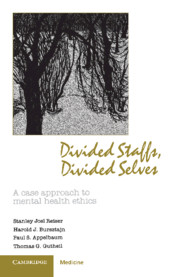“DO NOT RESUSCITATE” FOR THE LIVING
The responsibilities of staff and society to a deinstitutionalized patient, at an acute psychiatric facility.
The patient is a 50-year-old man with a diagnosis of mental retardation and a concomitant depression, as well as epilepsy. He has been an inpatient for the last three years at a community mental health center (CMHC), to which he was transferred from a large state hospital. He was the illegitimate child of alcoholic parents and has been a ward of the state since he was 3. Since that move two nursing home placements have been attempted, neither of which lasted longer than a month. According to the latest treatment plan, the patient requires services and training in the following problem areas: retardation and depression, personal hygiene, need for a citizen advocate to ensure availability of services, routine medical and psychological evaluations, grooming, eating, weight loss, chronic obstructive lung disease, seizure and movement disorder, obsessive concerns with death, a tendency toward masturbatory self-stimulation in public settings, the need to increase production rate at work, functional academic training, skills for self-preservation in society, learning of social skills, dentures, home placement.
The patient's transfer to the mental health center was part of a plan by the state's department of mental health to close down several units at the state hospital and to deinstitutionalize a number of patients. The review team in charge of this process of transfer determined that this patient and another had the greatest potential of all for development.
